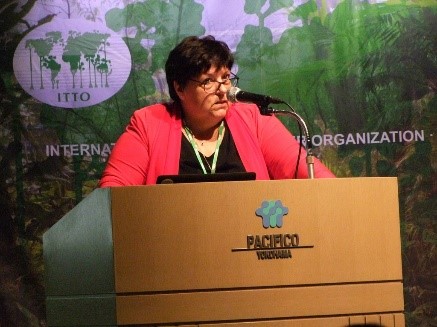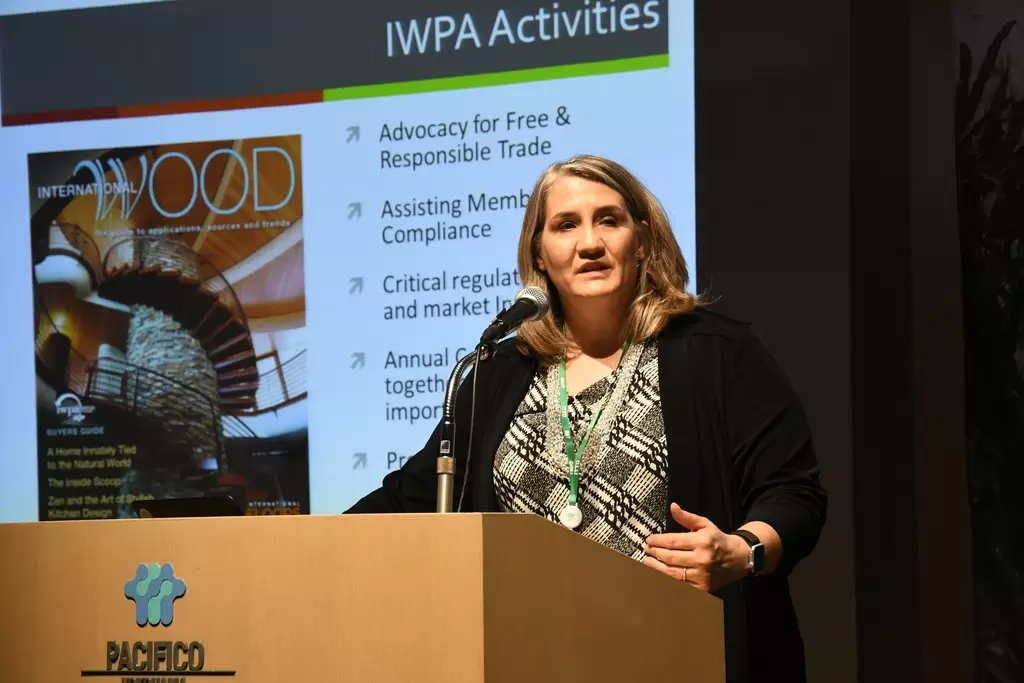

15.11.2018
« More cooperation needed to promote sustainably produced tropical timber « .“There would be major advantages for the sector if tropical timber producers, tropical timber traders and other stakeholders could combine their messages,” said Discussion Chair, André de Boer. “We need to present a united front to convince consumers of the very real advantages of using sustainably produced tropical timber.”
This was the message to emerge from the 2018 ITTO Annual Market Discussion, which took place on November, 6, in Yokoama, during the 54th Session of the International Tropical Timber Council.
Participants in the Discussion heard that, despite advances in sustainable tropical forest management, certification and legality verification, the tropical timber trade faced major challenges, such as changes in species mixes and preferences and declining market share in the face of competition from engineered wood and alternative non-wood materials.
The Discussion featured presentations from seven trade experts and representatives of trade organizations.
Benoît Jobbé-Duval from the International Tropical Timber Technical Association (ATIBT) provided background on activities ATIBT is carrying out to establish a “Fair and Precious” brand for tropical wood products. The aim of the initiative, which has been conceived by Forest Stewardship Council-certified member companies of ATIBT, is to promote certified tropical timber and show the environmental, social, economic and technical benefits of tropical timber consumption.
 Françoise van de Ven, Secretary-General of the Union des Forestiers Industriels du Gabon et Aménagistes, said there were more than 3 million hectares of FSC-certified forests in Gabon. Despite the effort and expense companies had invested to certify their forests, however, this has not been reflected in increased remuneration for producers. Without adequate financing of long-term promotion, she said, consumers will continue to see only negative reports on tropical timber harvesting. Françoise Van de Ven also contributed to the panel on gender equality on Thursday, November 8, to talk about the place of women in the African forest sector.
Françoise van de Ven, Secretary-General of the Union des Forestiers Industriels du Gabon et Aménagistes, said there were more than 3 million hectares of FSC-certified forests in Gabon. Despite the effort and expense companies had invested to certify their forests, however, this has not been reflected in increased remuneration for producers. Without adequate financing of long-term promotion, she said, consumers will continue to see only negative reports on tropical timber harvesting. Françoise Van de Ven also contributed to the panel on gender equality on Thursday, November 8, to talk about the place of women in the African forest sector.
Qian Meng from the Chinese Academy of Forestry provided an overview of the Global Green Supply Chain Mechanism, an initiative of China’s private timber sector. The vision of the Mechanism’s founding members is to “establish a stable and orderly green supply chain for global forest products in order to promote the green and sustainable development of forest resources and products”.
Eric D. de Munck from the Netherlands Timber Trade Association said tropical wood importers in his country have long been accused of encouraging deforestation. Ultimately, however, the trade had taken responsibility for its imports, committing to no longer importing timber that could be illegal and progressively increasing the proportion of imports consisting of sustainably produced timber. The target for 2020 is 90%. “Now we are considered a credible partner,” said Mr de Munck. He outlined wide-ranging successful efforts within the trade in the Netherlands to address public perceptions on tropical timber, including the publishing of life-cycle analyses that show sustainably produced tropical timber has vastly superior environmental performance compared with concrete, steel and composite plastics.
Ngo Sy Hoai, Vice Secretary General of the Vietnam Timber and Forest Products Association, said the Viet Nam timber sector exports forest products worth about USD 8.0 billion to 120 countries annually. Despite its seeming success, however, Viet Nam’s timber sector faces major challenges. The absence of a national forest certification scheme, and a lack of cooperation amongst Vietnamese timber associations, was hindering development, said Mr Ngo. “Moreover, production costs continue to rise to satisfy importers’ demands for legality verification, but there is no compensation—there is a “market” premium but no price premium”, he said.
Gleisson Omar Tagliari, Director of the Mato Grosso State Timber Production and Exportation Industries Center (CIPEM) in Brazil, said that CIPEM, a group of eight forest-based employer unions representing more than 600 companies, has an active trade promotion function. The sector faces many challenges, he said, but, “first and foremost is the need for sector image change because the timber sector is still viewed as a villain. Only positive promotion can reverse this.”
 Cindy Squires, Executive Director of the International Wood Products Association (IWPA), USA, said the purpose of her association is to build acceptance and demand in North America for globally sourced wood products from sustainably managed forests. She spoke about the multimodal approach taken by the IWPA to fulfill its purpose.
Cindy Squires, Executive Director of the International Wood Products Association (IWPA), USA, said the purpose of her association is to build acceptance and demand in North America for globally sourced wood products from sustainably managed forests. She spoke about the multimodal approach taken by the IWPA to fulfill its purpose.
Trade Advisory Group laments decline in tropical timber market share The tropical timber trade in consumer countries is struggling because of declining market share, in part due to competition from engineered products and other substitutes, according to a statement delivered by Barney Chan on behalf of the Trade Advisory Group (TAG) in conjunction with the Annual Market Discussion.
TAG was established in 2000 to provide inputs to ITTO’s policy and project work. It is open to anyone with an interest in the tropical timber trade, including representatives of tropical forest industries, timber exporters and importers, timber trade and industry consultants, and trade and industry associations.
According to the TAG statement, the potential exit of certain French timber companies from Central Africa “is a big ‘red flag’ which our Organization should sit up and take careful note of. … We have to admit that business as usual is not good enough to save our industry and the forests.”
TAG proposed that ITTO undertake a study to determine why SFM has not been delivering on the promise of expanding markets for tropical timber with a view to developing a Council strategy to reverse the situation.